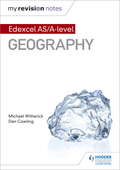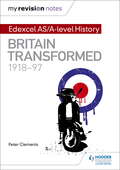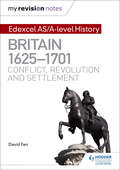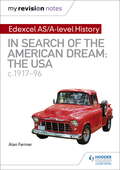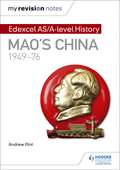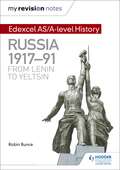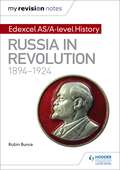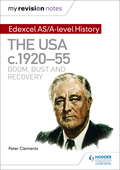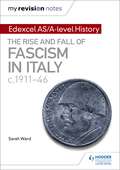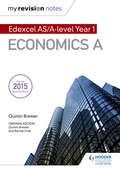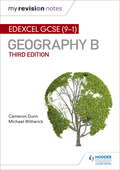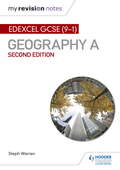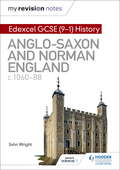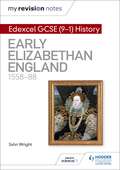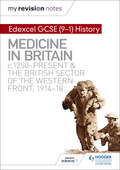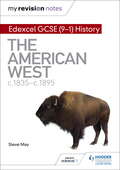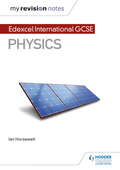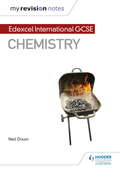- Table View
- List View
My Revision Notes: Edexcel AS/A-level Geography
by Michael Witherick Dan CowlingTarget success in Edexcel AS/A-level Geography with this proven formula for effective, structured revision; key content coverage is combined with exam-style tasks and practical tips to create a revision guide that students can rely on to review, strengthen and test their knowledge.With My Revision Notes every student can:- Plan and manage a successful revision programme using the topic-by-topic planner- Consolidate subject knowledge by working through clear and focused content coverage- Test understanding and identify areas for improvement with regular 'Now Test Yourself' tasks and answers- Enhance exam responses using relevant case studies for each topic- Improve exam technique through practice questions, expert tips and examples of typical mistakes to avoid
My Revision Notes: Edexcel AS/A-level History South Africa, 1948–94: from apartheid state to 'rainbow nation'
by Peter ClementsTarget success in Edexcel AS/A-level History with this proven formula for effective, structured revision; key content coverage is combined with exam preparation activities and exam-style questions to create a revision guide that students can rely on to review, strengthen and test their knowledge.- Enables students to plan and manage a successful revision programme using the topic-by-topic planner- Consolidates knowledge with clear and focused content coverage, organised into easy-to-revise chunks- Encourages active revision by closely combining historical content with related activities- Helps students build, practise and enhance their exam skills as they progress through activities set at three different levels- Improves exam technique through exam-style questions with sample answers and commentary from expert authors and teachers- Boosts historical knowledge with a useful glossary and timeline
My Revision Notes: Edexcel AS/A-level History: Britain transformed, 1918-97
by Peter ClementsExam Board: EdexcelLevel: AS/A-levelSubject: HistoryFirst Teaching: September 2015First Exam: June 2016Target success in Edexcel AS/A-level History with this proven formula for effective, structured revision; key content coverage is combined with exam preparation activities and exam-style questions to create a revision guide that students can rely on to review, strengthen and test their knowledge.- Enables students to plan and manage a successful revision programme using the topic-by-topic planner- Consolidates knowledge with clear and focused content coverage, organised into easy-to-revise chunks- Encourages active revision by closely combining historical content with related activities- Helps students build, practise and enhance their exam skills as they progress through activities set at three different levels- Improves exam technique through exam-style questions with sample answers and commentary from expert authors and teachers- Boosts historical knowledge with a useful glossary and timeline
My Revision Notes: Edexcel AS/A-level History: Britain, 1625-1701: Conflict, revolution and settlement
by Dr David FarrExam Board: EdexcelLevel: AS/A-levelSubject: HistoryFirst Teaching: September 2015First Exam: June 2016Target success in Edexcel AS/A-level History with this proven formula for effective, structured revision; key content coverage is combined with exam preparation activities and exam-style questions to create a revision guide that students can rely on to review, strengthen and test their knowledge.- Enables students to plan and manage a successful revision programme using the topic-by-topic planner- Consolidates knowledge with clear and focused content coverage, organised into easy-to-revise chunks- Encourages active revision by closely combining historical content with related activities- Helps students build, practise and enhance their exam skills as they progress through activities set at three different levels- Improves exam technique through exam-style questions with sample answers and commentary from expert authors and teachers- Boosts historical knowledge with a useful glossary and timeline
My Revision Notes: Edexcel AS/A-level History: Germany and West Germany, 1918-89
by Barbara WarnockExam Board: EdexcelLevel: AS/A-levelSubject: HistoryFirst Teaching: September 2015First Exam: June 2016Target success in Edexcel AS/A-level History with this proven formula for effective, structured revision; key content coverage is combined with exam preparation activities and exam-style questions to create a revision guide that students can rely on to review, strengthen and test their knowledge.- Enables students to plan and manage a successful revision programme using the topic-by-topic planner- Consolidates knowledge with clear and focused content coverage, organised into easy-to-revise chunks- Encourages active revision by closely combining historical content with related activities- Helps students build, practise and enhance their exam skills as they progress through activities set at three different levels- Improves exam technique through exam-style questions with sample answers and commentary from expert authors and teachers- Boosts historical knowledge with a useful glossary and timeline
My Revision Notes: Edexcel AS/A-level History: In search of the American Dream: the USA, c1917–96
by Alan FarmerTarget success in Edexcel AS/A-level History with this proven formula for effective, structured revision; key content coverage is combined with exam preparation activities and exam-style questions to create a revision guide that students can rely on to review, strengthen and test their knowledge.- Enables students to plan and manage a successful revision programme using the topic-by-topic planner- Consolidates knowledge with clear and focused content coverage, organised into easy-to-revise chunks- Encourages active revision by closely combining historical content with related activities- Helps students build, practise and enhance their exam skills as they progress through activities set at three different levels- Improves exam technique through exam-style questions with sample answers and commentary from expert authors and teachers- Boosts historical knowledge with a useful glossary and timeline
My Revision Notes: Edexcel AS/A-level History: Mao's China, 1949-76
by Andrew FlintExam Board: EdexcelLevel: AS/A-levelSubject: HistoryFirst Teaching: September 2015First Exam: June 2016Target success in Edexcel AS/A-level History with this proven formula for effective, structured revision; key content coverage is combined with exam preparation activities and exam-style questions to create a revision guide that students can rely on to review, strengthen and test their knowledge.- Enables students to plan and manage a successful revision programme using the topic-by-topic planner- Consolidates knowledge with clear and focused content coverage, organised into easy-to-revise chunks- Encourages active revision by closely combining historical content with related activities- Helps students build, practise and enhance their exam skills as they progress through activities set at three different levels- Improves exam technique through exam-style questions with sample answers and commentary from expert authors and teachers- Boosts historical knowledge with a useful glossary and timeline
My Revision Notes: Edexcel AS/A-level History: Russia 1917-91: From Lenin to Yeltsin
by Robin BunceExam Board: EdexcelLevel: AS/A-levelSubject: HistoryFirst Teaching: September 2015First Exam: June 2016Target success in Edexcel AS/A-level History with this proven formula for effective, structured revision; key content coverage is combined with exam preparation activities and exam-style questions to create a revision guide that students can rely on to review, strengthen and test their knowledge.- Enables students to plan and manage a successful revision programme using the topic-by-topic planner- Consolidates knowledge with clear and focused content coverage, organised into easy-to-revise chunks- Encourages active revision by closely combining historical content with related activities- Helps students build, practise and enhance their exam skills as they progress through activities set at three different levels- Improves exam technique through exam-style questions with sample answers and commentary from expert authors and teachers- Boosts historical knowledge with a useful glossary and timeline
My Revision Notes: Edexcel AS/A-level History: Russia in revolution, 1894-1924
by Robin BunceExam Board: EdexcelLevel: AS/A-levelSubject: HistoryFirst Teaching: September 2015First Exam: June 2016Target success in Edexcel AS/A-level History with this proven formula for effective, structured revision; key content coverage is combined with exam preparation activities and exam-style questions to create a revision guide that students can rely on to review, strengthen and test their knowledge.- Enables students to plan and manage a successful revision programme using the topic-by-topic planner- Consolidates knowledge with clear and focused content coverage, organised into easy-to-revise chunks- Encourages active revision by closely combining historical content with related activities- Helps students build, practise and enhance their exam skills as they progress through activities set at three different levels- Improves exam technique through exam-style questions with sample answers and commentary from expert authors and teachers- Boosts historical knowledge with a useful glossary and timeline
My Revision Notes: Edexcel AS/A-level History: Russia in revolution, 1894-1924
by Robin BunceExam Board: EdexcelLevel: AS/A-levelSubject: HistoryFirst Teaching: September 2015First Exam: June 2016Target success in Edexcel AS/A-level History with this proven formula for effective, structured revision; key content coverage is combined with exam preparation activities and exam-style questions to create a revision guide that students can rely on to review, strengthen and test their knowledge.- Enables students to plan and manage a successful revision programme using the topic-by-topic planner- Consolidates knowledge with clear and focused content coverage, organised into easy-to-revise chunks- Encourages active revision by closely combining historical content with related activities- Helps students build, practise and enhance their exam skills as they progress through activities set at three different levels- Improves exam technique through exam-style questions with sample answers and commentary from expert authors and teachers- Boosts historical knowledge with a useful glossary and timeline
My Revision Notes: Edexcel AS/A-level History: The USA, c1920–55: boom, bust and recovery
by Peter ClementsExam Board: EdexcelLevel: AS/A-levelSubject: HistoryFirst Teaching: September 2015First Exam: June 2016Target success in Edexcel AS/A-level History with this proven formula for effective, structured revision; key content coverage is combined with exam preparation activities and exam-style questions to create a revision guide that students can rely on to review, strengthen and test their knowledge.- Enables students to plan and manage a successful revision programme using the topic-by-topic planner- Consolidates knowledge with clear and focused content coverage, organised into easy-to-revise chunks- Encourages active revision by closely combining historical content with related activities- Helps students build, practise and enhance their exam skills as they progress through activities set at three different levels- Improves exam technique through exam-style questions with sample answers and commentary from expert authors and teachers- Boosts historical knowledge with a useful glossary and timeline
My Revision Notes: Edexcel AS/A-level History: The rise and fall of Fascism in Italy c1911-46
by Laura Gallagher Sarah WardExam Board: EdexcelLevel: AS/A-levelSubject: HistoryFirst Teaching: September 2015First Exam: June 2016Target success in Edexcel AS/A-level History with this proven formula for effective, structured revision; key content coverage is combined with exam preparation activities and exam-style questions to create a revision guide that students can rely on to review, strengthen and test their knowledge.- Enables students to plan and manage a successful revision programme using the topic-by-topic planner- Consolidates knowledge with clear and focused content coverage, organised into easy-to-revise chunks- Encourages active revision by closely combining historical content with related activities- Helps students build, practise and enhance their exam skills as they progress through activities set at three different levels- Improves exam technique through exam-style questions with sample answers and commentary from expert authors and teachers- Boosts historical knowledge with a useful glossary and timeline
My Revision Notes: Edexcel As Economics (My Revision Notes)
by Quintin BrewerTarget success in Edexcel AS Economics with this proven formula for effective, structured revision; key content coverage is combined with exam-style tasks and practical tips to create a revision guide that students can rely on to review, strengthen and test their knowledge.With My Revision Notes from experienced author Quintin Brewer, every student can:- Plan and manage a successful revision programme using the topic-by-topic planner- Consolidate subject knowledge by working through clear and focused content coverage- Test understanding and identify areas for improvement with regular 'Now Test Yourself' tasks and answers- Improve exam technique through practice questions, expert tips and examples of typical mistakes to avoid- Get exam ready with last minute quick quizzes at www.hoddereducation.co.uk/myrevisionnotes
My Revision Notes: Edexcel GCSE (91) Geography B Third Edition
by Cameron Dunn Michael WitherickExam Board: EdexcelLevel: GCSESubject: GeographyFirst Teaching: September 2016First Exam: Summer 2018Endorsed for EdexcelTarget success in Edexcel GCSE (9-1) Geography B with this proven formula for effective, structured revision; key content coverage is combined with exam-style tasks and practical tips to create a revision guide that students can rely on to review, strengthen and test their knowledge.With My Revision Notes every student can:- Plan and manage a successful revision programme using the topic-by-topic planner- Enjoy an active approach to revision with clear topic coverage and related 'Now Test Yourself' tasks and practical revision activities- Improve exam technique through exam tips and formal exam-style questions- Monitor their knowledge and progress using the answers provided for each 'Now Test Yourself' activity and exam-style question- Develop geographical understanding and enhance exam responses with case study material and located place examples
My Revision Notes: Edexcel GCSE (91) Geography A Second Edition
by Steph WarrenTarget success in Edexcel GCSE (9-1) Geography A with this proven formula for effective, structured revision; key content coverage is combined with exam-style tasks and practical tips to create a revision guide that students can rely on to review, strengthen and test their knowledge.With My Revision Notes every student can:- Plan and manage a successful revision programme using the topic-by-topic planner- Enjoy an active approach to revision with clear topic coverage and related 'Now Test Yourself' tasks- Improve exam technique through exam tips and formal exam-style questions- Monitor their knowledge and progress using the answers provided for each 'Now Test Yourself' activity and exam-style question- Develop geographical understanding and enhance exam responses with case study material and located place examples
My Revision Notes: Edexcel GCSE (9–1) Geography A Second Edition
by Steph WarrenExam board: EdexcelLevel: GCSESubject: Geography First teaching: September 2016First exams: Summer 2018Target success in Edexcel GCSE (9-1) Geography A with this proven formula for effective, structured revision; key content coverage is combined with exam-style tasks and practical tips to create a revision guide that students can rely on to review, strengthen and test their knowledge.With My Revision Notes every student can:- Plan and manage a successful revision programme using the topic-by-topic planner- Enjoy an active approach to revision with clear topic coverage and related 'Now Test Yourself' tasks- Improve exam technique through exam tips and formal exam-style questions- Monitor their knowledge and progress using the answers provided for each 'Now Test Yourself' activity and exam-style question- Develop geographical understanding and enhance exam responses with case study material and located place examples
My Revision Notes: Edexcel GCSE (Edexcel GCSE Geography B)
by Cameron Dunn Michael WitherickExam Board: EdexcelLevel: GCSESubject: GeographyFirst Teaching: September 2016First Exam: Summer 2018Endorsed for EdexcelTarget success in Edexcel GCSE (9-1) Geography B with this proven formula for effective, structured revision; key content coverage is combined with exam-style tasks and practical tips to create a revision guide that students can rely on to review, strengthen and test their knowledge.With My Revision Notes every student can:- Plan and manage a successful revision programme using the topic-by-topic planner- Enjoy an active approach to revision with clear topic coverage and related 'Now Test Yourself' tasks and practical revision activities- Improve exam technique through exam tips and formal exam-style questions- Monitor their knowledge and progress using the answers provided for each 'Now Test Yourself' activity and exam-style question- Develop geographical understanding and enhance exam responses with case study material and located place examples
My Revision Notes: Edexcel GCSE (Hodder GCSE History for Edexcel)
by John WrightExam Board: Pearson EdexcelLevel: GCSESubject: HistoryFirst teaching: September 2016First exams: Summer 2018Endorsed for EdexcelTarget success in Edexcel GCSE (9-1) History with this proven formula for effective, structured revision.Key content coverage is combined with exam-style questions, revision tasks and practical tips to create a revision guide that students can rely on to review, strengthen and test their knowledge.With My Revision Notes every student can:- Plan and manage a successful revision programme using the topic-by-topic planner- Enjoy an interactive approach to revision, with clear topic summaries that consolidate knowledge and related activities that put the content into context- Build, practise and enhance exam skills by progressing through activities set at different levels- Improve exam technique through exam-style questions and model answers with commentary from expert authors and teachers- Get exam ready with extra quick quizzes and answers to the activities available online
My Revision Notes: Edexcel GCSE (Hodder GCSE History for Edexcel)
by John WrightExam Board: Pearson EdexcelLevel: GCSESubject: HistoryFirst teaching: September 2016First exams: Summer 2018Endorsed for EdexcelTarget success in Edexcel GCSE (9-1) History with this proven formula for effective, structured revision.Key content coverage is combined with exam-style questions, revision tasks and practical tips to create a revision guide that students can rely on to review, strengthen and test their knowledge.With My Revision Notes every student can:> Plan and manage a successful revision programme using the topic-by-topic planner> Enjoy an interactive approach to revision, with clear topic summaries that consolidate knowledge and related activities that put the content into context> Build, practise and enhance exam skills by progressing through activities set at different levels> Improve exam technique through exam-style questions and model answers with commentary from expert authors and teachers> Get exam ready with extra quick quizzes and answers to the activities available online
My Revision Notes: Edexcel GCSE (Hodder GCSE History for Edexcel)
by Sam SlaterExam Board: Pearson EdexcelLevel: GCSESubject: HistoryFirst teaching: September 2016First exams: Summer 2018Endorsed for EdexcelTarget success in Edexcel GCSE (9-1) History with this proven formula for effective, structured revision.Key content coverage is combined with exam-style questions, revision tasks and practical tips to create a revision guide that students can rely on to review, strengthen and test their knowledge.With My Revision Notes every student can:> Plan and manage a successful revision programme using the topic-by-topic planner> Enjoy an interactive approach to revision, with clear topic summaries that consolidate knowledge and related activities that put the content into context> Build, practise and enhance exam skills by progressing through activities set at different levels> Improve exam technique through exam-style questions and model answers with commentary from expert authors and teachers> Get exam ready with extra quick quizzes and answers to the activities available online
My Revision Notes: Edexcel GCSE (My Revision Notes)
by Alec FisherExam board: Pearson EdexcelLevel: GCSESubject: HistoryFirst teaching: September 2016First exams: Summer 2018Endorsed for EdexcelTarget success in Edexcel GCSE (9-1) History with this proven formula for effective, structured revision.Key content coverage is combined with exam-style questions, revision tasks and practical tips to create a revision guide that students can rely on to review, strengthen and test their knowledge.With My Revision Notes every student can:> Plan and manage a successful revision programme using the topic-by-topic planner> Enjoy an interactive approach to revision, with clear topic summaries that consolidate knowledge and related activities that put the content into context> Build, practise and enhance exam skills by progressing through activities set at different levels> Improve exam technique through exam-style questions and model answers with commentary from expert authors and teachers> Get exam ready with extra quick quizzes and answers to the activities available online
My Revision Notes: Edexcel GCSE (My Revision Notes)
by Steve MayExam board: Pearson EdexcelLevel: GCSESubject: History First teaching: September 2016First exams: Summer 2018Endorsed for EdexcelTarget success in Edexcel GCSE (9-1) History with this proven formula for effective, structured revision.Key content coverage is combined with exam-style questions, revision tasks and practical tips to create a revision guide that students can rely on to review, strengthen and test their knowledge.With My Revision Notes every student can:> Plan and manage a successful revision programme using the topic-by-topic planner> Enjoy an interactive approach to revision, with clear topic summaries that consolidate knowledge and related activities that put the content into context> Build, practise and enhance exam skills by progressing through activities set at different levels> Improve exam technique through exam-style questions and model answers with commentary from expert authors and teachers> Get exam ready with extra quick quizzes and answers to the activities available online
My Revision Notes: Edexcel GCSE (My Revision Notes)
by Steve WaughExam Board: Pearson EdexcelLevel: GCSESubject: HistoryFirst teaching: September 2016First exams: Summer 2018Endorsed for EdexcelTarget success in Edexcel GCSE (9-1) History with this proven formula for effective, structured revision.Key content coverage is combined with exam-style questions, revision tasks and practical tips to create a revision guide that students can rely on to review, strengthen and test their knowledge.With My Revision Notes every student can:> Plan and manage a successful revision programme using the topic-by-topic planner> Enjoy an interactive approach to revision, with clear topic summaries that consolidate knowledge and related activities that put the content into context> Build, practise and enhance exam skills by progressing through activities set at different levels> Improve exam technique through exam-style questions and model answers with commentary from expert authors and teachers> Get exam ready with extra quick quizzes and answers to the activities available online
My Revision Notes: Edexcel International GCSE (MRN)
by Ian HorsewellTarget success in Edexcel International GCSE Physics with this proven formula for effective, structured revision; key content coverage is combined with exam-style tasks and practical tips to create a revision guide that students can rely on to review, strengthen and test their knowledge.- Plan and manage a successful revision programme using the topic-by-topic planner - Consolidate subject knowledge by working through clear and focused content coverage - Test understanding and identify areas for improvement with regular 'Now Test Yourself' tasks and answers - Improve exam technique through practice questions, expert tips and examples of typical mistakes to avoid - Get exam ready with extra quick quizzes and answers to the practice questions available online
My Revision Notes: Edexcel International GCSE (MRN)
by Neil DixonTarget success in Edexcel International GCSE Chemistry with this proven formula for effective, structured revision; key content coverage is combined with exam-style tasks and practical tips to create a revision guide that students can rely on to review, strengthen and test their knowledge. - Plan and manage a successful revision programme using the topic-by-topic planner - Consolidate subject knowledge by working through clear and focused content coverage - Test understanding and identify areas for improvement with regular 'Now Test Yourself' tasks and answers - Improve exam technique through practice questions, expert tips and examples of typical mistakes to avoid - Get exam ready with extra quick quizzes and answers to the practice questions available online
